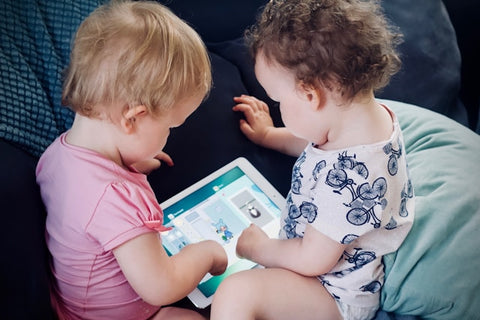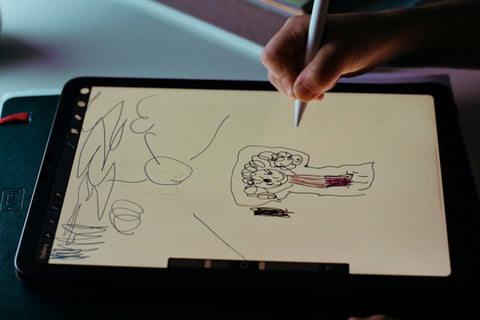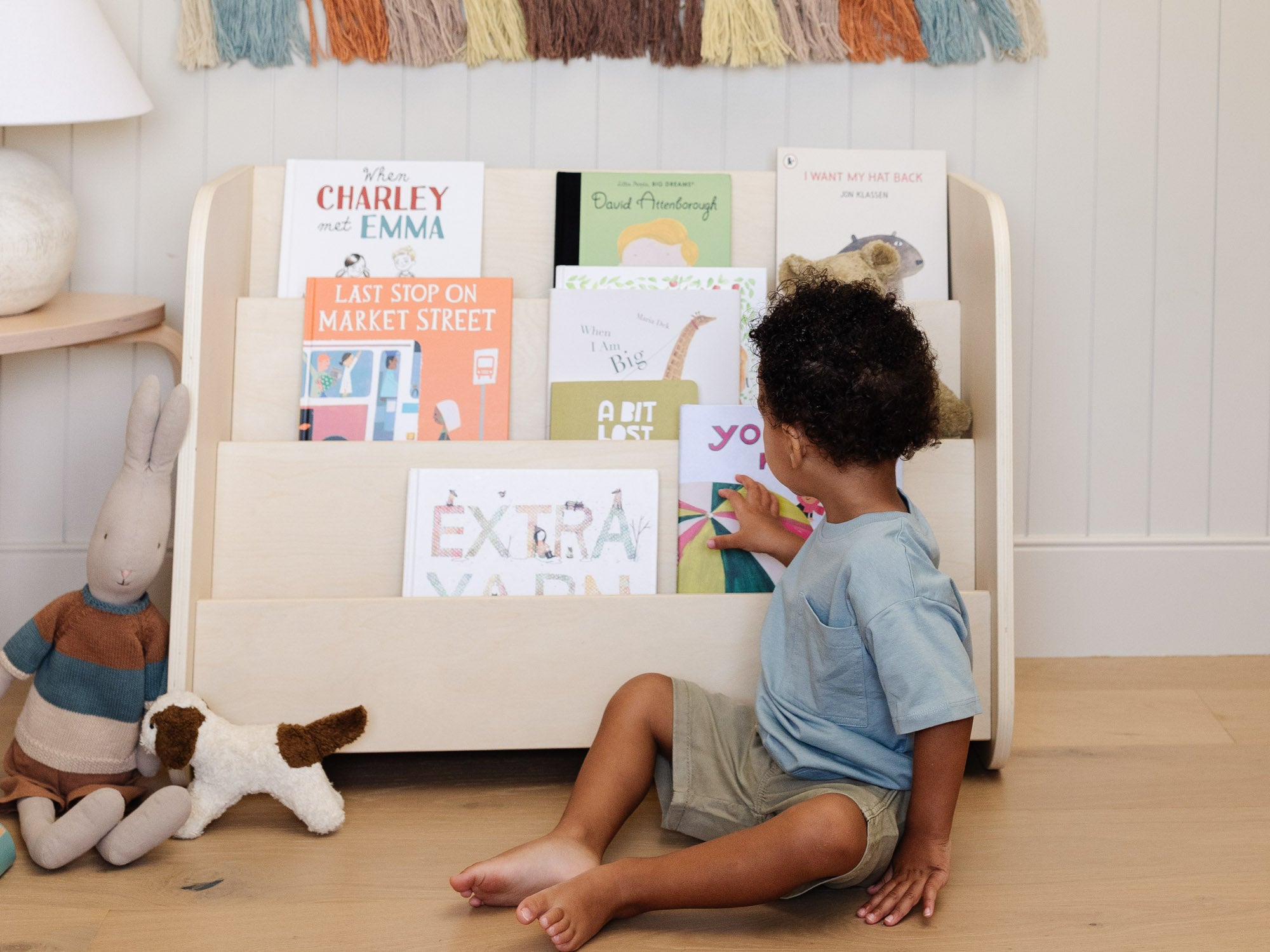As a parent, it can be hard to know how to manage screen time with our kids. Many questions arise such as "How much screen time is too much?" Also, "Does healthy screen time exist, or is all screen time bad?"
At my house, we use a Montessori approach to regulate and limit screen time. This approach can help you learn how to turn off screen time without a fight. We'll cover the details of how parents can limit screen time and how too much time on screens can affect your child. Plus, we'll explore a Montessori perspective on screen time and current guidelines.
What Would Montessori Say About Screen Time for Children?
Dr. Maria Montessori lived in the early 1900s, long before there were electronic devices, screens, or even TV. What would Montessori say about children's screen time?
Montessori was a scientist who looked at the world through a lens of curiosity. Arguably, Montessori would want to watch children using digital devices before making a decision about screen time. She would probably use her observations to determine if there's any type of healthy screen time. The Montessori method also focuses heavily on hands-on activities like cooking, counting objects, gardening, and more.
A Montessori Perspective on the Digital World
As a Montessori mama and former Montessori teacher, my guess is that Montessori would accept some screen time. Digital devices offer a passport to endless information, learning, and connection. I think Montessori would have recognized that and welcomed the benefits screen time offers.
Yet, I do believe she would encourage parents and teachers to limit children's time in front of screens. If you're a parent, you know children may become disregulated and grouchy when they have too much screen time. I think Montessori would have noticed this and recommended healthy limits.
Additionally, Montessori might recommend guidelines around screen time. Montessori made recommendations about the types of books children should read and what materials they should use. She prioritized using quality materials and books.
Similarly, she might encourage children to use screen time for video calls and creative endeavors such as photography and videography. Or, she might recommend children watch educational videos about nature and cultures around the world.
Guidelines for Recommended Screen Time by Age
Experts agree that young children shouldn't get hours and hours of screen time every day. Instead, children should enjoy a range of activities that promote brain development and social skills. That said, as your child grows, they'll naturally want to watch TV or play digital games.
What are the recommended guidelines for screen time?
Screen Time Recommendations for Babies

Organizations such as the American Academy of Child & Adolescent Psychology (AACAP), American Academy of Pediatrics (AAP), and WHO don't recommend screen time for babies. The only exception is participating in a video call.
At 18 months, the AACAP suggests that toddlers may watch "educational programming with a caregiver."
Why is Screen Time Bad for Babies?
Studies show that spending time on screens in infancy can lead to changes in brain development. When children get a lot of screen time as babies, they have more trouble focusing and managing their emotions in school.
Babies need lots of face-to-face interaction to learn and grow. Screen time may replace enriching activities and interactions, resulting in fewer opportunities for healthy development.
Screen Time Recommendations for Toddlers
The WHO recommends parents of 2 to 4-year-olds limit screen time to one hour per day. However, the organization recommends reducing your young child's screen time as much as possible. Similar to babies, toddlers also need lots of social interaction and experiences in the real world.
Screen Time Recommendations for Children
The CDC reports that children who are 8 to 10 years old spend as much as 6 hours a day using screens for entertainment. This means children are missing out on other important activities like physical activity, reading, and playing. Also, less than 25% of children ages 6 to 17 meet exercise guidelines, which is 60 minutes of activity each day.
Although the AAP doesn't offer a set number of hours per day for screen time in children, they do recommend parents monitor screen time. Once concern is that too much screen time may have a negative impact on your child's growing eyes. Parents should also ensure children meet other needs such as getting enough sleep, being active, and playing.
Screen Time Recommendations for Teens
The American Academy of Pediatrics recommends that parents guide their teens about digital citizenship and online interactions. Plus, parents can help ensure teens achieve a healthy relationship with their digital devices. In other words, parents should ensure teens make time for healthy habits like sleeping, exercising, socializing, etc.
Should Parents Limit Screen Time for Kids?
Limiting screen time is an effective way for parents to ensure their kids grow up happy and healthy. In my experience, limiting screen time helps children learn to make healthy choices. Every family is different and can approach screen time in their own way. In my home, a Montessori approach to limiting screen time helps reduce screen time without too much argument.
A Montessori Approach to Limiting Screen Time for Children

While there is no universal Montessori approach to limiting screen time, here's how I do it in my home with my school-aged children.
1. Prioritize Healthy Screen Time
What counts as healthy screen time will depend on your family. In my family, it means choosing content that is age-appropriate and non-violent. Plus, I encourage my children to choose interactive, educational games and activities rather than passive screen time.
I also tend to be more lenient about some activities. For example, I don't count listening to audiobooks toward screen time. We also enjoy watching the occasional movie or soccer game as a family. This gives us the chance to discuss topics that come up and process media together.
2. Set Clear Boundaries to Reduce Screen Time
We have a set screen time routine that helps my children know what to expect. During the school year, they enjoy one hour of screen time after school. We use a timer to keep track of the time and ensure they know when to stop. They may also watch one TV program after dinner. On weekends, we give them a bit more freedom and may also watch a movie as a family.
Using a timer is my number one tip for eliminating tantrums and meltdowns. Another helpful approach is to give your child a warning ahead of time so they know to wrap up their game. This way, your child can get to a natural stopping point if they're playing a video game.
Different families may have different rules and change them to adjust to different circumstances. For example, if my children have homework and soccer practice on the same night, I may shorten screen time.
Additionally, we don't use screens at the dinner table and make a point to regularly spend screen-free time as a family. We also avoid using screens as a solution for boredom. Other rules to consider include:
- No screen time within 30 minutes of bedtime to help your child fall asleep
- No tablets or smartphones in the bedroom overnight
- Make other activities such as outdoor time a prerequisite for screen time
- Use parental controls to keep your child safe online
3. Set a Good Example
Montessori emphasized that adults should model behaviors to children. In our home, this means that the parents have some rules to follow, too. We don't use our phones at the dinner table and try to avoid "technoference."
"Technoference" or "phone snubbing" happens when people pay more attention to devices than the people in front of them. This practice can be particularly damaging to family relationships. When spending time with my kids, I strive to put my phone away so that I can give them my full attention.
4. Discuss How Screen Time Makes Your Child Feel
At times, my kids become moody following a period of gaming or video watching. Screen time can cause a variety of changes in the brain. Some video games may cause stress, while others create an effect similar to addiction. Additionally, screen time can limit your ability to focus, resulting in angry outbursts.
We often discuss how screen time can make us feel tired, frustrated, or temperamental. Then, we try to notice what can boost our moods, such as exercise, going outside, or spending time with a friend.
What About a Screen Time Detox?
If screen time is problematic for your child, you can consider a digital detox. A screen time detox for toddlers and school-aged children can help break the cycle. Consider eliminating all screen time for a week or two. While the first few days can be a challenge, it does get easier as your child withdraws.
A screen time detox can help you and your child create new screen time guidelines. I've used a screen time detox with my children on occasion to reset our goals. This strategy also helps children think differently about their relationship to digital devices.
5. Create an Enriching Environment
When children have an enriching environment with screen time alternatives, they are less likely to get hooked. Each child has their own unique interests. Some options to enrich your home include:
- Climbing and play equipment such as a Pikler Triangle or Balance Board
- Indoor or outdoor plants to care for
- A pet to care for
- Lots of books to read in a cozy reading corner
- A helper tower so your child can help cook and bake
- Musical instruments such as keyboards or xylophones
- Arts and crafts
Promoting a Healthy Relationship with Technology

Excessive screen time is associated with health issues like trouble sleeping, mood disorders, and obesity. On the other hand, technology is a staple of modern society. As a mother, my goal is to help my children learn to use technology in positive ways.
Part of that includes learning to moderate how much time they spend on electronic devices. Right now, I play a major part of the equation by limiting their screen time. As they grow, I will slowly let them make more decisions while guiding them to ensure they meet the needs of their bodies and minds.
How do you handle screen time in your house? Tell us about your approach in the comments.
Sources:
1. Babies and Screen Time: Boston Children’s Hospital
2. Beyond Screen Time: Help Your Kids Build Healthy Media Use Habits: American Academy of Pediatrics (AAP)
3. Guidelines on Physical Activity, Sedentary Behavior, and Sleep: World Health Organization (WHO)
4. Is Technoference Damaging Your Relationships?: Psychology Today
5. Screen Time and Children: American Academy of Child & Adolescent Psychology (AACAP)
6. Screen Time Vs. Lean Time: Centers for Disease Control and Prevention (CDC)
7. What Does Screen Time Do To My Brain?: State University of New York
8. Where We Stand: Screen Time American Academy of Pediatrics (AAP)








Leave a comment
This site is protected by hCaptcha and the hCaptcha Privacy Policy and Terms of Service apply.